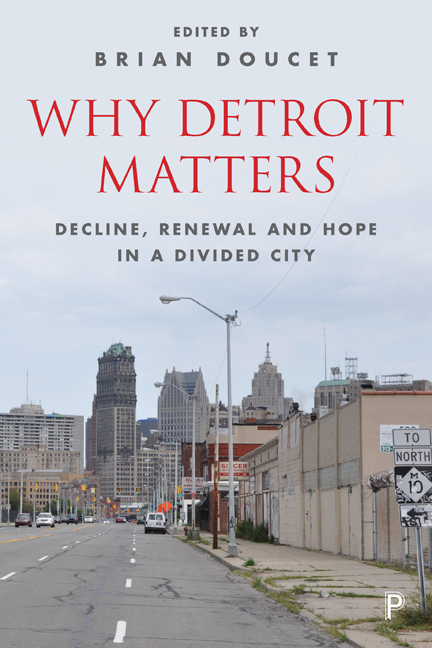Book contents
- Frontmatter
- Contents
- List of contributors
- List of figures and tables
- Acknowledgments
- one Introduction: why Detroit matters
- Section One Lessons from Detroit
- Intermezzo I You may not know my Detroit
- Section Two Practices from Detroit
- Intermezzo II My Detroit
- Section Three Conversations from Detroit
- References
- Index
four - Between economic revival and social disruption: the redevelopment of Greater Downtown and the emergence of new socio-spatial inequalities
Published online by Cambridge University Press: 05 April 2022
- Frontmatter
- Contents
- List of contributors
- List of figures and tables
- Acknowledgments
- one Introduction: why Detroit matters
- Section One Lessons from Detroit
- Intermezzo I You may not know my Detroit
- Section Two Practices from Detroit
- Intermezzo II My Detroit
- Section Three Conversations from Detroit
- References
- Index
Summary
The next two chapters examine forces central to the production of inequality in contemporary Detroit. We start with the work of René Kreichauf, who, as part of the research project “Smart Decline? Shrinking Cities in the USA” (Technical University Berlin, 2009/10) and the ongoing project “Crisis Cities and the Development of New Socio-Spatial Inequalities,” started in 2014, investigates the effects of the revitalization taking place in Greater Downtown Detroit. The approach of these two projects has been to focus on the impact of growth-centered urban regeneration strategies and urban austerity politics on socio-spatial disparities in declining cities. Their empirical research uses both quantitative data analysis and qualitative interviews and observations, the latter being drawn upon for this chapter. Interviews with stakeholders and local residents leads to an empirically rich case study which argues that Detroit's much-celebrated recovery is deeply unequal and is taking place along racial, class, and spatial lines. Theoretically, Kreichauf uses a neo-Marxist perspective on the causes of urban decline and the policy and political reactions to it. One of this chapter's strengths is its ability to explain these theories for readers who may be unfamiliar with them, while also contextualizing Detroit within neo-Marxist theories for readers who already have a strong theoretical background. Kreichauf sees the concept of a declining city not as a new permanent urban development type, but rather as a consequence of the system of capitalism, which cities such as Detroit are inherently connected to.
In the conclusion, he also highlights the concern that while Detroit's renaissance is celebrated in some circles, there is a danger that this could be seen as a “successful” economic model for other shrinking cities to follow, furthering social and spatial inequalities within cities. Kreichauf reminds us to critically question these assertions in light of the extreme divisions being produced in Detroit today. Using Chrysler's celebrity-filled Super Bowl commercials, he cautions against simplistic narratives of either “decline” or “renewal.”
René Kreichauf is a PhD candidate at the John F. Kennedy Institute for North American Studies at the Freie Universität Berlin, Germany, and at Cosmopolis—Centre for Urban Research at the Vrije Universiteit Brussel, Belgium, with a background in urban planning and sociology. He is a graduate of the international Master's Program in Urban Studies (run jointly through the Vrije Universiteit Brussel, Université Libre de Bruxelles, Universität Wien, Københavns Universitet, Universidad Autónoma de Madrid, and Universidad Complutense de Madrid.
- Type
- Chapter
- Information
- Why Detroit MattersDecline, Renewal and Hope in a Divided City, pp. 75 - 94Publisher: Bristol University PressPrint publication year: 2017



